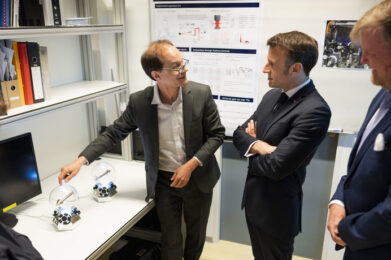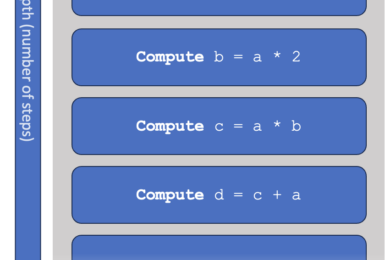- Preface: Why this guide?
- Part 1 – The background: Why are we so enthusiastic about Quantum Technology?
- Part 2 – The applications: What problems will we solve with Quantum Computers?
- Part 3 – The developments: Searching for a killer application, with a closer look at artificial fertilizer
- Part 4 – The applications of Quantum Networks
- Part 5 – Timelines: When can we expect a useful quantum computer?
- Part 6 – Getting started: What steps should your organization take?
- Part 7 – The hardware: Why you should care about different qubits
- Part 8 – The threat: The impact on cybersecurity
- Part 9 – Scaling up: Why we need error correction
- Further reading: An overview of resources
Preface: Why this guide?
This free book contains everything you should know about quantum computers, without going into tedious technical details.
It is the perfect resource for anyone who wants to professionally understand quantum computers, but does not need a full physics background. For example, we aim at:
- Managers and strategic decision makers
- Consultants
- Policy makers
- CIO or CISO departments
| This book is about... | This book is not about... |
|---|---|
| The impact that quantum technology has on business and society | Essential math or physics |
| Opportunities and threats | Quantum programming |
| Timelines | Exhaustive information about every possible detail |
“Quantum computing will change everything,” the man in front of me said. Standing tall and confident, he took another sip of his drink before continuing, “It will be the biggest revolution since the invention of the transistor. Imagine a world where we can cure any disease with personalised medicine. A world where new energy sources will free us from our dependence on fossil fuels. Not to mention that…”
“Well—” I tried to interrupt, but the man passionately rattled on.
“It will finally enable us to build general Artificial Intelligence that can take over our tedious everyday jobs, so 95% of our population no longer has to work!”
“You know that quantum computers are still quite some years away, right?”, I countered. He leaned in, eyes gleaming with excitement.
“That’s what most people think. But the reality is, we’re closer than ever. Quantum supremacy has already been achieved. Google did it in 2019. Since then, progress has been exponential. Did you see the presentation by that guy from QuantaLeap? He could instantly simulate ninety thousand investment portfolios thanks to this quantum annealing algorithm.”
The above conversation captures a feeling that many seasoned experts in quantum computing will have. And perhaps this scene is not even exaggerated. Plentiful reputable sources report that ‘quantum’ is key in tackling climate change, revolutionising AI, and building unhackable networks.
Experts who are actually building these quantum computers are much, much more reluctant. At an academic conference, you hear a completely different story. Scientists ridicule the absurd claims that come from consultants and some aggressive startups. They will point out that the applications of quantum computers are still very much uncertain, and that we’re still searching for convincing uses of these computers.
The quantum scene seems to have two completely separate worlds. A business world, that reaches out to anybody who will hear them about the revolutionary capabilities of quantum computers. And the academic world, the community of experts that quietly bring this quantum computer to reality, sharing their results in technical papers that require a PhD to understand.
I was grasped by this paradoxical situation. What can we really expect from quantum technology? What are quantum computers good at, and how does this compare to other alternatives? When will we have a large-scale quantum computer, and what will it look like? Having the luxury of working at the interface between a large research group and a community of commercial entities, I have the ideal boundary conditions to understand the story from both sides and to translate the academic knowledge into the perspective of a company, an IT department, or a government.
I started writing these texts for two reasons. First, I aim to offer an alternative to the hyped and unbalanced articles that would otherwise populate the top entries in Google search results (or even the New York Times best-selling books). Second, I see the need for a reliable source of information that others can reference when disagreeing about facts or debunking myths. I am already very grateful for the many colleagues who frequently refer to an early version of this book!
That doesn’t mean that this book contains only confirmed facts – not at all! Writing about a computer of the future comes with uncertainty. In 2005, nobody could have predicted that just a few years later, everyone would be playing games and consuming the internet on their smartphones. In 2015, nobody could have predicted the impact of Large Language Models like ChatGPT. And indeed, today, our best predictions of a future quantum revolution won’t be quite so accurate either.
Even worse, experts wildly disagree in several cases. For example, the usefulness of quantum AI and optimization is continuously disputed, and the rate at which hardware will progress depends on some yet-to-discover breakthroughs. The best I could do is describe various perspectives on these matters and highlight the best arguments from either side.
Without plentiful discussions and disagreements, I wouldn’t have been able to gather the facts and opinions in this book. And it shouldn’t stop there. I keep welcoming criticism, opinions, and feedback about these complex topics, hoping to refine these texts even more in future updates.
Even though much is still uncertain, I think that a reliable picture of the prospects of quantum computing is more important than ever. Quantum startups are acquiring huge investments, allowing them to hire managers, software developers, salesmen, and marketers. Governments need informed policymakers, and journalists should cover quantum breakthroughs. Pretty much every organisation that deals with IT will want to keep a close eye on the impact that ‘quantum’ will have on them.
This book is for precisely these people who don’t need to understand all the technical details but still need to talk, read, and write about quantum technologies. This is why I will focus on an accessible language that everyone can understand. We don’t care so much about the underlying math or physics, but rather about the functionality of a quantum computer: the opportunities, the threats, and the concrete actions organisations can take.




